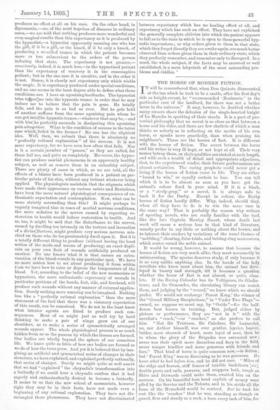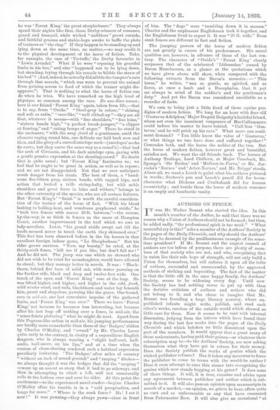THE HORSE OF MODERN FICTION.
TT will be remembered that, when Don Quixote dismounted at the inn which he took to be a castle, after his first day's ride as knight-errant, he "recommended Rosinante ' to the particular care of the landlord, for there was not a better horse in the universe." It may, however, be doubted whether many owners share the delusion of the single-hearted knight of La Mancha in speaking of their steeds. It is a part of pro- verbial philosophy that no secret is so close as that between a horse and his rider, and there are few chattels of which a man thinks so soberly as in reflecting on the merits of his own horse, or speaks more guardedly, than when praising his neighbour's. These are the horses of fact. It is different with the horses of fiction. The secret between the horse and his writer is very ill kept, or not kept at all. Their very names betray them, or their qualities are stated at such length, and with such a wealth of detail and appropriate adjectives, that, to the experienced reader, their future performances are almost certainties. The racing prophets could never get a living if the horses of fiction came to life. They are either "bound to win," or equally certain to lose. You can tell which it is to be almost as soon as you have got the animal's colour fixed in your mind. If it is a black, or a " steely-gray," or a sorrel, it. is always safe to back it for the Derby. Except in colour, the Derby horses of fiction 'hardly differ. Why, indeed, should they, when all they have to do is to win the same race in the same way P That is probably the reason why writers of sporting novels, who are really familiar with the turf, like the late Captain Hawley Smart, whose death last week will cause a serious loss in that kind of literature, usually prefer to say little or nothing about the horses, and to interest their readers by variations of the usual themes of "nobbling," cheating, false trials, and betting-ring manceuvres, which centre round the noble animal.
It would be wrong, however, to assume that because the horses of fiction are very much alike, they must necessarily be uninteresting. The species deserves study, if only because it is so very unlike anything else. In the hands of the lady novelists who know most about him, the animal has deve- loped in beauty and strength, till it becomes a question whether the horse of fact is not almost, or quite, obso- lete. If the Racing Calendar has its Voltigeurs, its Gladia- tears, and its Ormondes, the circulating library can match them, and judging by the "record," we know which we should prefer. We would not exchange Forest King,' the winner of the" Grand Military Steeplechase," in "Under Two Flags "— owned, we suppose we must say, by " Ouida"—for the half- dozen best horses in training. But, judged either by picture or performance, they are "not in it" with the. novelist's "crack,"—or "cracker," as she prefers to call him. "Not Sir Tristram, Sir Caledore, Sir Launeelot, no, nor Arthur himself, was ever gentler, loyaler, braver, bolder, more staunch of heart, more loyal of soul, than he to whom the glory of the Brigades was entrusted now ; never was their spirit more ,dauntless and fiery in the field, never temper kindlier and more generous with friends and foes." That kind of horse is quite common now,—in fiction ; but Forest King' was as discerning as he was generous. He knew what he had before hint, and he did not care. "Miles of the ridge and furrow, stiff fences of terrible backthorn [sic], double posts and rails, yawners, and croppers both, tough as Shire and Stewards could make them, awaited him on the morrow. On his beautiful lean head capfuls of money were piled by the Service and the Talents, and in his stride all the fame of the Household would be centred. But he took his rest like the 'cracker' that he was, standing as though on guard, firm and steady as a rock, a hero every inch of him, for• he was Forest King,' the great steeplechaser." They always spend their nights like that, those Derby-winners of romance, grand and tranquil, while wicked " nobblers " prowl outside, and faithful grooms and stable-boys awake to baffle the plots of trainers or "the ring." If they happen to be standing up and lying down at the same time, no matter,—we may credit it to the physical development of the horse of fiction. Take, for example, the case of Tartuffe,' the Derby favourite in "Lewis Arundel." What if he were "reposing his graceful limbs in his box," and also "happened not to be lying down, but standing, trying through his muzzle to tibble the straw of his bed" P (And, indeed, he actually did nibble the tempter's oats through that muzzle, "which was worn to prevent the animal from gaining access to food of which the trainer might dis- approve.") That is nothing to what the horse of fiction can do when he tries. We have remarked on the high level of physique so common among the race. Ex uno disce omnes ; here is our friend Forest King' again, taken from life,—that is to say, from " Ouida." "Steel-grey in colour," "shining and soft as satin," "race-like," well ribbed-up "—they are all that, whatever it means—with "fine shoulders," "fine loins," "sixteen hands high," "a perfect brook-jumper," "a clipper at fencing," and "eating lumps of sugar." There he stood in the enclosure, "with the sang froid of a gentleman, amid the clamour raging round him, one delicate ear laid back now and then, and the glory of a curved antelope neck—[antelopes' necks do curve, but they curve the same way as a camel's]—that had the arch of Circassia, and his dark antelope eyes, gazing with a gentle pensive expression at the shouting crowd." No donbt that is quite usual ; but Forest King' fascinates us ; we feel that he ought to be great in action, as well as in repose ; and we are not disappointed. Not that we ever anticipate much danger from his rivals. The best of them, a "hand- some flea-bitten grey, sixteen hands, with ragged hips, and action that looked a trifle string-halty, but with noble shoulders and great force in loins and withers," belongs to the other extremity of the species, who are all certain failures. But Forest King's' " finish " is worth the careful considera- tion of the trainer of the horse of fact. "With his blood lashing to boiling-heat, and wondrous greyhound stride," he "took two fences with scarce 20 ft. between,"—the course, by-the-way, is as thick in fences as the maze at Hampton Court, another improvement in the turf which we owe to lady-novelists. Later, "his grand stride swept out till the hoofs seemed never to touch the earth they skimmed over." This feat has been observed before in the tin horses in that excellent foreign indoor game, Le Steeplechase." But his rider grows anxious. "Now, my beauty," he cried, at the thirty-sixth fence, "kill me if you like, but don't fail me I" And he did not. The jump was one which no steward who did not wish to be tried for manslaughter, would have allowed to stand ; but they manage better in novels. It was : " Black- thorn, behind five bars of solid oak, with water yawning on the further side, black and deep and twelve feet wide. One touch of the spur, and Forest King' rose at the leap. He was lifted higher, and higher, and higher in the cold, fresh, wild winter wind, and rails, blackthorn and water lay beneath him, gaunt and shapeless, yawning like the grave. One bound, even in mid-air, one last convulsive impulse of the gathered limbs, and Forest King' was over." There we leave Forest King,' not because he becomes less interesting, but because after his last leap off nothing over a fence, in mid-air, the "sense faints picturing " what he might do next. Apart from this Pegasus-like action in mid-air, his jumping performances are hardly more remarkable than those of the Badger,' ridden by Charles O'Malley, and " owned " by Mr. Charles Lever quite early in the century, in rivalry of a supercilious English dragoon, who is always wearing a "slight half-curl, half- smile, half-sneer, on his lips," and at a time when the custom of clean-shaving rendered such a habitual expression peculiarly irritating. The Badger,' after miles of country "without an inch of sound ground," and "rasping" ditches— we always thought it was the hedges that did the " rasping " --went up an ascent so steep that it had to go sideways, and then in attempting to climb a 5-ft. wall not unnaturally rolls to the bottom over and over its rider. At this point the excitement—to the experienced novel-reader—begins. Charles O'Malley after his tumble is in a "cold perspiration, and longs for more." "Where is the sunk fence P Ha! I see it now!" It was yawning—they always yawn—close in front of him. The " dogs " were "tumbling down it in masses." Charles and the unpleasant Englishman took it together, and the Englishman lived to regret it. It was "20 ft. wide." Even sunk fences are different in fact and fiction.
The jumping powers of the horse of modern fiction are not greatly in excess of his predecessors. His moral qualities are, however, in advance of those of the last cen- tury. The character of " Ouida's " Forest King' clearly surpasses that of the celebrated 'Lithuanian' owned by Baron Munchausen, as a glance at the quotations which we have given above will show, when compared with the following extracts from the Baron's memoirs : " This horse," he writes, "was so gentle, so spirited, and so fierce, at once a lamb and a Bucephalus, that it put me always in mind of the soldier's and the gentleman's duty." And yet the Baron was considered unreliable as a recorder of fads.
We own to being just a little tired of these equine pro- digies of modern fiction. We long for an hour with dear old Gustavus Adolphus,' Major Dugald Dalgetty's faithful friend, whom not even the imminent vengeance of MacCallummore could induce his master to leave behind. "Call him 'Gus- tavus,' and he will prick up his ears." What more can senti- ment demand ? "You little know the value of Gustavus,' or what things we two have done and suffered together!" Comrades both, and the horse the nobler of the two. But the horse of modern fiction, however great and beautiful, satisfies not. We want the old friends back. The horses of Anthony Trollope, Lord Chiltern, or Major Caneback, Mr. Sponge's Sir Ercles,' and Multum-in-Parvo,' or Mr. Sor- rooks's 'Xerxes' and Arter-Xerxes,' and Mr. Briggs' steeds. Above all, we want a Leech to paint what his authors pictured in words ; Surtees's pen and Leech's pencil did for horse. character what Dickens and Cruilcshank did for human eccentricity ; and beside them the horse of modern romance is an empty and bombastic vanity.



































 Previous page
Previous page